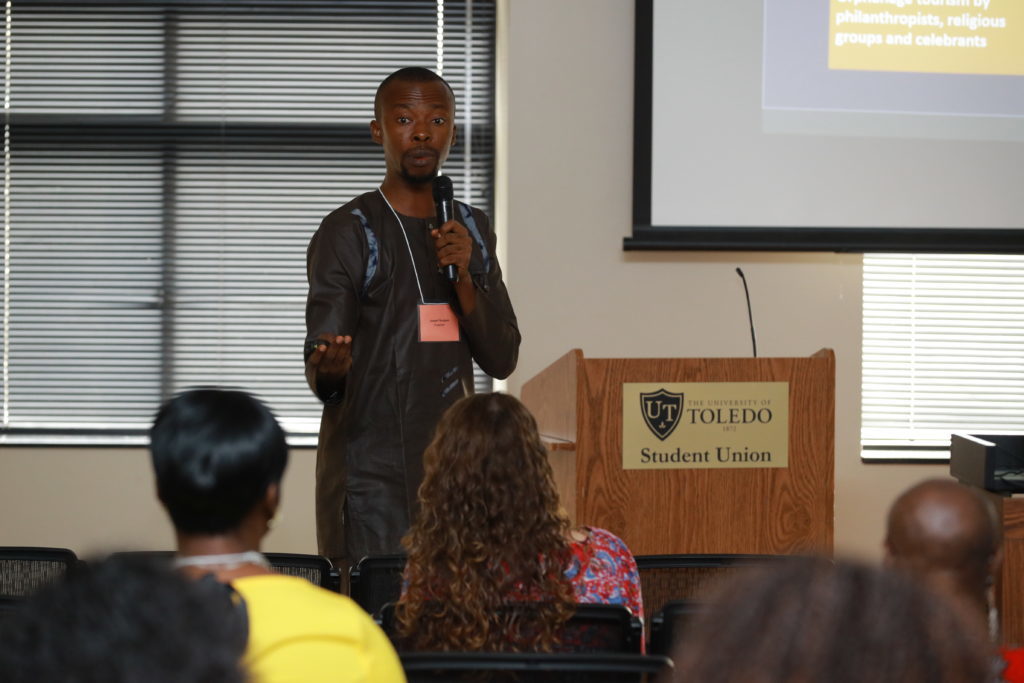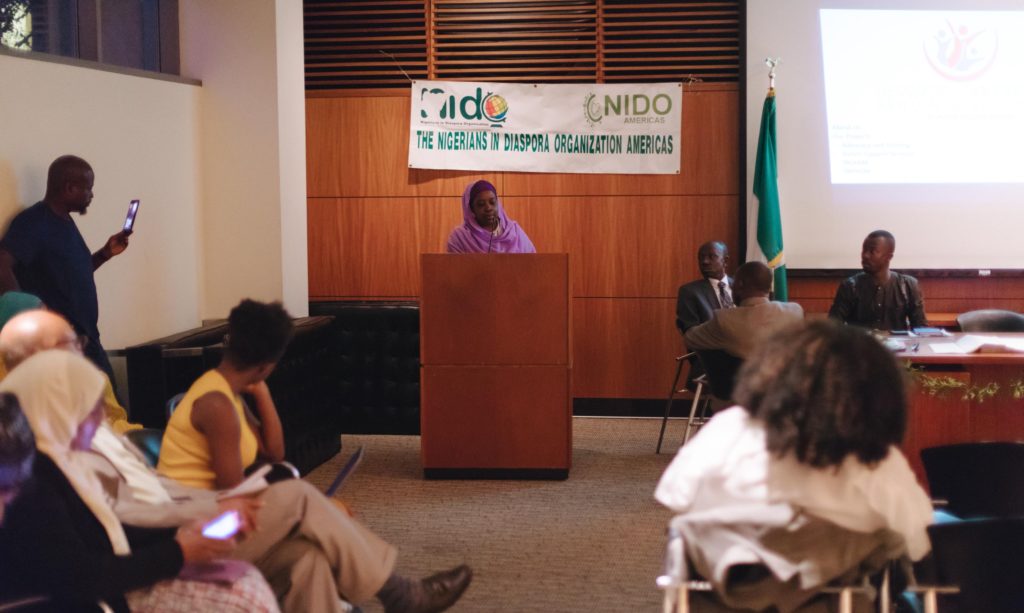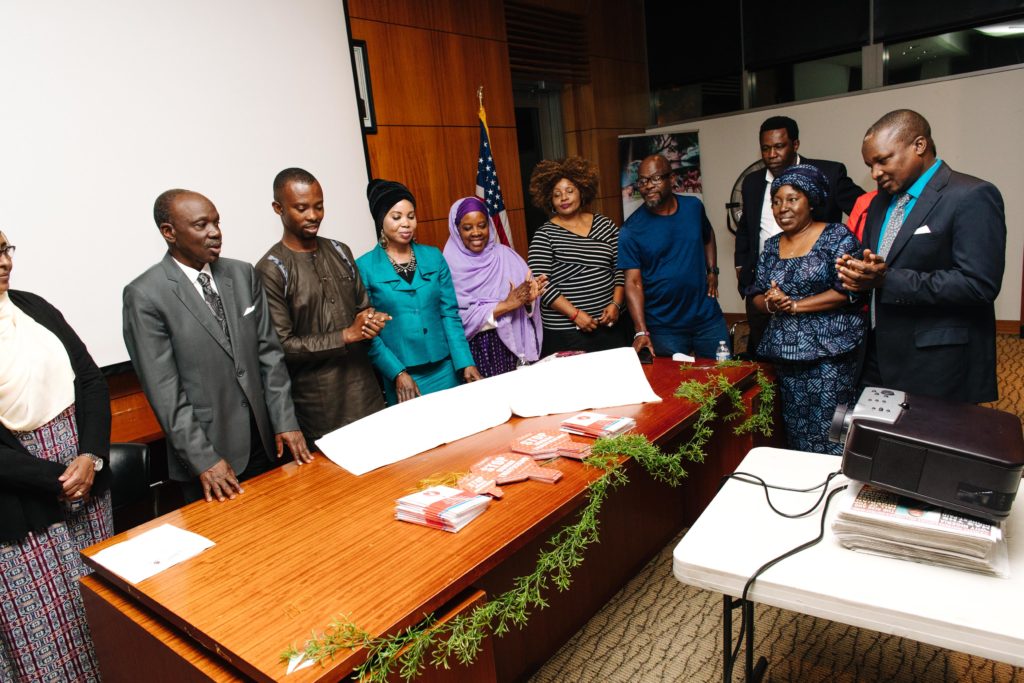Joseph Osuigwe charges Nigerians in diaspora to take up the fight against human trafficking

Joseph Osuigwe, Executive Director, Devatop Centre for African Development has charged Nigerians in the diaspora to take up the fight against human trafficking as the Europe and America continues to be the destination of most victims of trafficking.
He said this at the Nigerian Embassy in the United States, Washington D.C. while delivering his presentation on Combating Human Trafficking in Nigeria, New Trends, Challenges and The Role of Nigerians in Diaspora organised by The Washington D.C. Chapter of Nigerians in Diaspora Organization formally known as NIDO.
 Sharing the shocking statistic that 1.3 million Nigerians are victims of human trafficking, Osuigwe challenged everyone in attendance to take immediate action, reminding people that human trafficking is a worldwide issue and not only rampant in Nigeria.
“It is a costly assumption to think that human trafficking affects only Edo City. Human Trafficking affects every state in Nigeria and it is spreading like a virus to every local government area.
“Human trafficking is a stoppable crime, and apart from the works of government and non-government organizations, Nigerians in Diaspora have essential roles to play in stopping it,” Osuigwe said.
He also added that Human trafficking is a stoppable crime, and apart from the works of government and non-governmental organizations, Nigerians in Diaspora have essential roles to play in stopping it.
Joseph Osuigwe also unveiled his book titled, “Becoming An Anti-Human Trafficking Advocacy” and DEVATOP’s “Stop Human Trafficking” Cards.
Other Nigerians on the panel included Dr Sadia Ali Aden, Samuel Adewusi (moderator), Chike Anyanwu, Dr Doris Johnson, Asma Inge-Hanif and Dr Juliet Mbonu.
Offering an invaluable perspective on the detrimental effects of human trafficking on one’s health was Dr Sadia Ali Aden and Dr Doris Johnson. Johnson, a medical practitioner with a focus on clinical nutrition focused on the effects of mental health in relation to human trafficking. Delving into the various forms of trafficking (i.e human trafficking, labour trafficking and organ trafficking), Johnson highlighted the mental health implications that come along with human trafficking and the effects of physical acts of violence. Aden shared on the indicators and implications of trauma by way of human trafficking and emphasized that “We should pay a lot more attention to the health aspect because there is a lot more to it (than) the physical trauma we see every day.”
Asma Inge-Hanif, a chaplain and nurse, executive director and founder of Muslimat Al Nisaa Shelter, a refuge for victims of human trafficking, refugees and domestic violence, in her words, shared how her 40 years of experience within the community, led her to understand that homeless women and children among the most vulnerable populations to be targeted by human traffickers. Approaching the issue of human trafficking with a heart full of empathy she has not only opened her heart to these survivors but her home, “I need to be able to provide a safe haven for these individuals.”
DDrJuliet Mbonu, CEO of Rika Film Productions shared a trailer for her film “Breakout,” exposing the ways in which women in developing countries are at risk of human trafficking. Candidate for State Delegate District 21, Chike Anyanwu discussed his personal sentiments around human trafficking and possible political solutions.
Sharing the shocking statistic that 1.3 million Nigerians are victims of human trafficking, Osuigwe challenged everyone in attendance to take immediate action, reminding people that human trafficking is a worldwide issue and not only rampant in Nigeria.
“It is a costly assumption to think that human trafficking affects only Edo City. Human Trafficking affects every state in Nigeria and it is spreading like a virus to every local government area.
“Human trafficking is a stoppable crime, and apart from the works of government and non-government organizations, Nigerians in Diaspora have essential roles to play in stopping it,” Osuigwe said.
He also added that Human trafficking is a stoppable crime, and apart from the works of government and non-governmental organizations, Nigerians in Diaspora have essential roles to play in stopping it.
Joseph Osuigwe also unveiled his book titled, “Becoming An Anti-Human Trafficking Advocacy” and DEVATOP’s “Stop Human Trafficking” Cards.
Other Nigerians on the panel included Dr Sadia Ali Aden, Samuel Adewusi (moderator), Chike Anyanwu, Dr Doris Johnson, Asma Inge-Hanif and Dr Juliet Mbonu.
Offering an invaluable perspective on the detrimental effects of human trafficking on one’s health was Dr Sadia Ali Aden and Dr Doris Johnson. Johnson, a medical practitioner with a focus on clinical nutrition focused on the effects of mental health in relation to human trafficking. Delving into the various forms of trafficking (i.e human trafficking, labour trafficking and organ trafficking), Johnson highlighted the mental health implications that come along with human trafficking and the effects of physical acts of violence. Aden shared on the indicators and implications of trauma by way of human trafficking and emphasized that “We should pay a lot more attention to the health aspect because there is a lot more to it (than) the physical trauma we see every day.”
Asma Inge-Hanif, a chaplain and nurse, executive director and founder of Muslimat Al Nisaa Shelter, a refuge for victims of human trafficking, refugees and domestic violence, in her words, shared how her 40 years of experience within the community, led her to understand that homeless women and children among the most vulnerable populations to be targeted by human traffickers. Approaching the issue of human trafficking with a heart full of empathy she has not only opened her heart to these survivors but her home, “I need to be able to provide a safe haven for these individuals.”
DDrJuliet Mbonu, CEO of Rika Film Productions shared a trailer for her film “Breakout,” exposing the ways in which women in developing countries are at risk of human trafficking. Candidate for State Delegate District 21, Chike Anyanwu discussed his personal sentiments around human trafficking and possible political solutions.
 Sharing the shocking statistic that 1.3 million Nigerians are victims of human trafficking, Osuigwe challenged everyone in attendance to take immediate action, reminding people that human trafficking is a worldwide issue and not only rampant in Nigeria.
“It is a costly assumption to think that human trafficking affects only Edo City. Human Trafficking affects every state in Nigeria and it is spreading like a virus to every local government area.
“Human trafficking is a stoppable crime, and apart from the works of government and non-government organizations, Nigerians in Diaspora have essential roles to play in stopping it,” Osuigwe said.
He also added that Human trafficking is a stoppable crime, and apart from the works of government and non-governmental organizations, Nigerians in Diaspora have essential roles to play in stopping it.
Joseph Osuigwe also unveiled his book titled, “Becoming An Anti-Human Trafficking Advocacy” and DEVATOP’s “Stop Human Trafficking” Cards.
Other Nigerians on the panel included Dr Sadia Ali Aden, Samuel Adewusi (moderator), Chike Anyanwu, Dr Doris Johnson, Asma Inge-Hanif and Dr Juliet Mbonu.
Offering an invaluable perspective on the detrimental effects of human trafficking on one’s health was Dr Sadia Ali Aden and Dr Doris Johnson. Johnson, a medical practitioner with a focus on clinical nutrition focused on the effects of mental health in relation to human trafficking. Delving into the various forms of trafficking (i.e human trafficking, labour trafficking and organ trafficking), Johnson highlighted the mental health implications that come along with human trafficking and the effects of physical acts of violence. Aden shared on the indicators and implications of trauma by way of human trafficking and emphasized that “We should pay a lot more attention to the health aspect because there is a lot more to it (than) the physical trauma we see every day.”
Asma Inge-Hanif, a chaplain and nurse, executive director and founder of Muslimat Al Nisaa Shelter, a refuge for victims of human trafficking, refugees and domestic violence, in her words, shared how her 40 years of experience within the community, led her to understand that homeless women and children among the most vulnerable populations to be targeted by human traffickers. Approaching the issue of human trafficking with a heart full of empathy she has not only opened her heart to these survivors but her home, “I need to be able to provide a safe haven for these individuals.”
DDrJuliet Mbonu, CEO of Rika Film Productions shared a trailer for her film “Breakout,” exposing the ways in which women in developing countries are at risk of human trafficking. Candidate for State Delegate District 21, Chike Anyanwu discussed his personal sentiments around human trafficking and possible political solutions.
Sharing the shocking statistic that 1.3 million Nigerians are victims of human trafficking, Osuigwe challenged everyone in attendance to take immediate action, reminding people that human trafficking is a worldwide issue and not only rampant in Nigeria.
“It is a costly assumption to think that human trafficking affects only Edo City. Human Trafficking affects every state in Nigeria and it is spreading like a virus to every local government area.
“Human trafficking is a stoppable crime, and apart from the works of government and non-government organizations, Nigerians in Diaspora have essential roles to play in stopping it,” Osuigwe said.
He also added that Human trafficking is a stoppable crime, and apart from the works of government and non-governmental organizations, Nigerians in Diaspora have essential roles to play in stopping it.
Joseph Osuigwe also unveiled his book titled, “Becoming An Anti-Human Trafficking Advocacy” and DEVATOP’s “Stop Human Trafficking” Cards.
Other Nigerians on the panel included Dr Sadia Ali Aden, Samuel Adewusi (moderator), Chike Anyanwu, Dr Doris Johnson, Asma Inge-Hanif and Dr Juliet Mbonu.
Offering an invaluable perspective on the detrimental effects of human trafficking on one’s health was Dr Sadia Ali Aden and Dr Doris Johnson. Johnson, a medical practitioner with a focus on clinical nutrition focused on the effects of mental health in relation to human trafficking. Delving into the various forms of trafficking (i.e human trafficking, labour trafficking and organ trafficking), Johnson highlighted the mental health implications that come along with human trafficking and the effects of physical acts of violence. Aden shared on the indicators and implications of trauma by way of human trafficking and emphasized that “We should pay a lot more attention to the health aspect because there is a lot more to it (than) the physical trauma we see every day.”
Asma Inge-Hanif, a chaplain and nurse, executive director and founder of Muslimat Al Nisaa Shelter, a refuge for victims of human trafficking, refugees and domestic violence, in her words, shared how her 40 years of experience within the community, led her to understand that homeless women and children among the most vulnerable populations to be targeted by human traffickers. Approaching the issue of human trafficking with a heart full of empathy she has not only opened her heart to these survivors but her home, “I need to be able to provide a safe haven for these individuals.”
DDrJuliet Mbonu, CEO of Rika Film Productions shared a trailer for her film “Breakout,” exposing the ways in which women in developing countries are at risk of human trafficking. Candidate for State Delegate District 21, Chike Anyanwu discussed his personal sentiments around human trafficking and possible political solutions.

